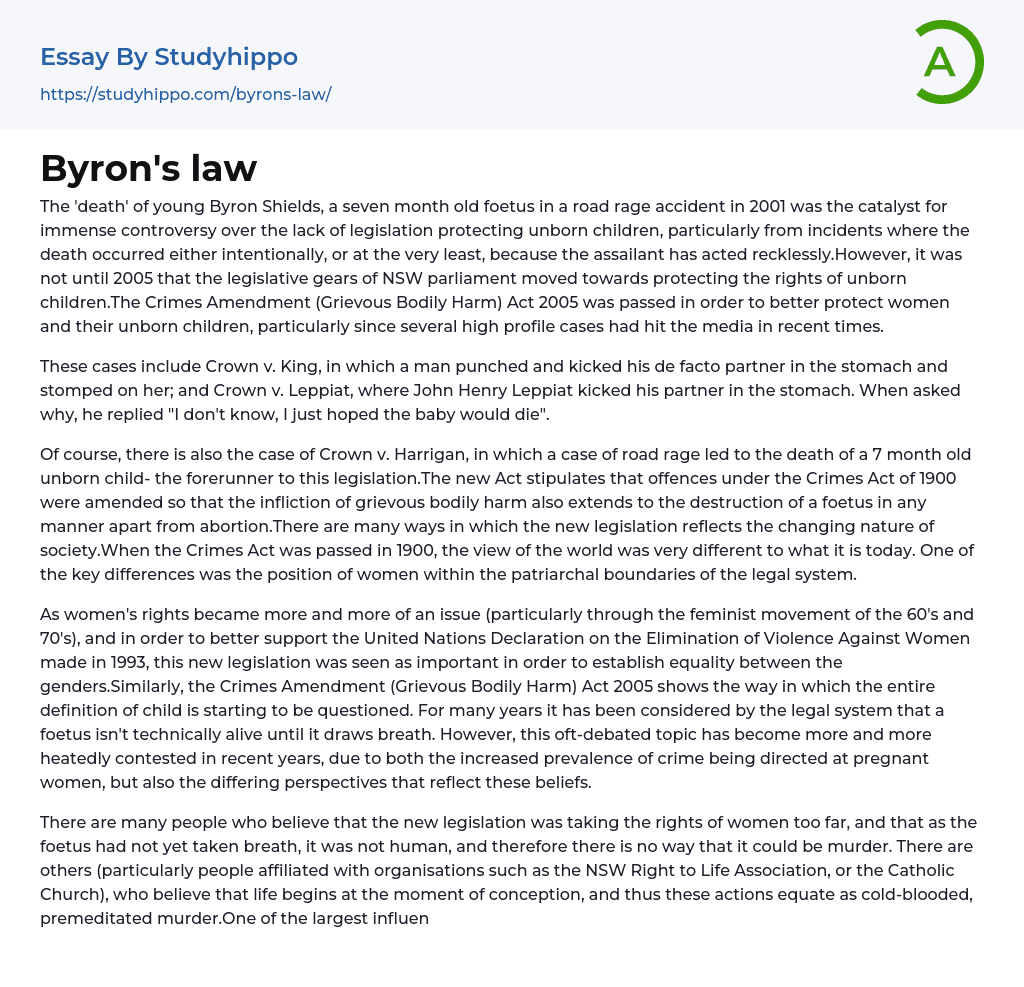The 'death' of young Byron Shields, a seven month old foetus in a road rage accident in 2001 was the catalyst for immense controversy over the lack of legislation protecting unborn children, particularly from incidents where the death occurred either intentionally, or at the very least, because the assailant has acted recklessly.However, it was not until 2005 that the legislative gears of NSW parliament moved towards protecting the rights of unborn children.The Crimes Amendment (Grievous Bodily Harm) Act 2005 was passed in order to better protect women and their unborn children, particularly since several high profile cases had hit the media in recent times.
These cases include Crown v. King, in which a man punched and kicked his de facto partner in the stomach and stomped on her; and Cro
...wn v. Leppiat, where John Henry Leppiat kicked his partner in the stomach. When asked why, he replied "I don't know, I just hoped the baby would die".
Of course, there is also the case of Crown v. Harrigan, in which a case of road rage led to the death of a 7 month old unborn child- the forerunner to this legislation.The new Act stipulates that offences under the Crimes Act of 1900 were amended so that the infliction of grievous bodily harm also extends to the destruction of a foetus in any manner apart from abortion.There are many ways in which the new legislation reflects the changing nature of society.When the Crimes Act was passed in 1900, the view of the world was very different to what it is today. One of the key differences was the position of women within the patriarchal boundaries o
the legal system.
As women's rights became more and more of an issue (particularly through the feminist movement of the 60's and 70's), and in order to better support the United Nations Declaration on the Elimination of Violence Against Women made in 1993, this new legislation was seen as important in order to establish equality between the genders.Similarly, the Crimes Amendment (Grievous Bodily Harm) Act 2005 shows the way in which the entire definition of child is starting to be questioned. For many years it has been considered by the legal system that a foetus isn't technically alive until it draws breath. However, this oft-debated topic has become more and more heatedly contested in recent years, due to both the increased prevalence of crime being directed at pregnant women, but also the differing perspectives that reflect these beliefs.
There are many people who believe that the new legislation was taking the rights of women too far, and that as the foetus had not yet taken breath, it was not human, and therefore there is no way that it could be murder. There are others (particularly people affiliated with organisations such as the NSW Right to Life Association, or the Catholic Church), who believe that life begins at the moment of conception, and thus these actions equate as cold-blooded, premeditated murder.One of the largest influences in the passing of this law however was the immense political pressure being placed upon the government. With outcomes in other cases not yet reflecting justice, many parties- including those families affected, the Church, various Right-to-Life Associations and the media- were trying to influence the government to pass legislation that would act
as both a deterrent, but also as an appropriate punishment, in situations such as these.It was not long, however, before the government had this legislation revoked.
In November of 2005, only six months after it was first introduced, the Crimes Amendment (Grievous Bodily Harm) Act 2005 was repealed under Section 4 of the Statute Law (Miscellaneous Provisions) Act (No 2) 2005, which was created both to cut costs, but also to revise statute law. This is representative of the government's desire to change the law, tempered with caution to ensure they are making the right decision.Since that date, several other states have passed legislation to protect pregnant women and their unborn children, most notably the ACT, with the Crimes (Offences Against Pregnant Women) Amendment Act 2006, but this too has been repealed by an overly cautious government.The necessity of a law to protect unborn children and their mothers is becoming more and more obvious.
As distasteful as it is, these situations have and will keep occurring. Unless more appropriate actions are taken, will there ever be any chance for our own children to grow up in a world free from such atrocities?With the repealing of the Crimes Amendment (Grievous Bodily Harm) Act 2005, a major weapon in the fight to protect our children has been removed. Let us hope that we don't live to regret its removal.
- Animal Cruelty essays
- Law Enforcement essays
- Juvenile Justice System essays
- Surveillance essays
- Forensic Science essays
- Crime Prevention essays
- Criminal Justice essays
- Criminology essays
- Drug Trafficking essays
- Juvenile Delinquency essays
- Organized Crime essays
- Penology essays
- Prison essays
- Property Crime essays
- Punishment essays
- Serial Killer essays
- Sexual Offence essays
- Victim essays
- Crime scene essays
- Punishments essays
- Charles Manson essays
- Juvenile Crime essays
- Piracy essays
- Stealing essays
- Gang essays
- Hate Crime essays
- Homicide essays
- Damages essays
- Murder essays
- Robbery essays
- Ted Bundy essays
- Prostitution essays
- Violent crime essays
- Rape essays
- Identity Theft essays
- Sexual Harassment essays
- Distracted Driving essays
- Drunk Driving essays
- Detention essays
- Sexual Assault essays
- Sexual Assault on College Campuses essays
- Cyber Crime essays
- White Collar Crime essays
- Fur essays
- Federal Bureau Of Investigation essays
- Fire Department essays
- Criminal Justice System essays
- Commitment essays
- Mass Incarceration essays
- Kill essays




